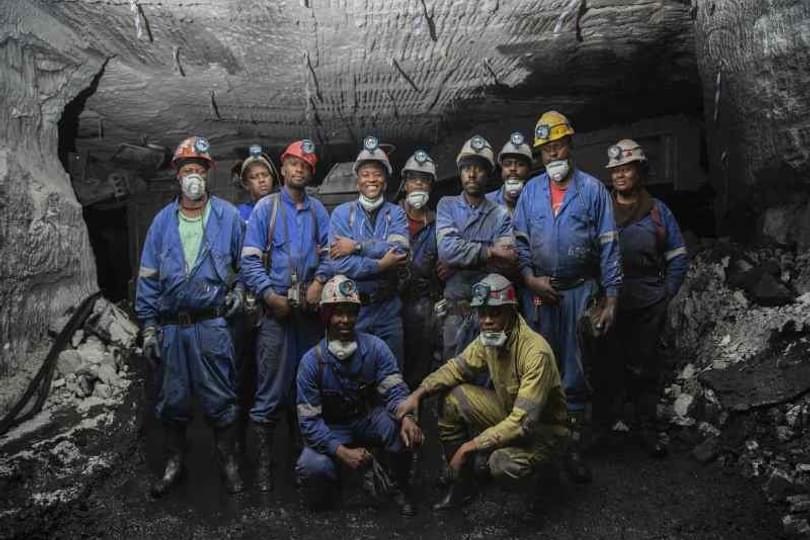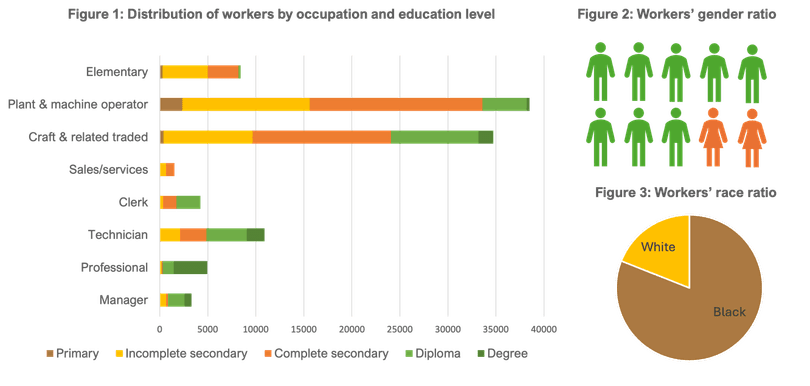
Our programme on the Future of Development collaborated with researchers from the Development Policy Research Unit in the University of Cape Town to conduct an in-depth analysis of the coal labour market in South Africa.
In a report titled 'Just Transition and the Labor Market in South Africa: Measuring Individual and Household Coal Economy Dependence', the authors highlight the labour market profiles, demographic characteristics, and education levels of coal workers to support policymakers in shaping their strategies for re-deployment to alternative industries.
Climate change mitigation necessitates that South Africa transitions away from coal dependency towards environmentally friendly sources of energy, as coal significantly contributes to the nation's CO2 emissions. However, this transition comes with socioeconomic costs, as coal is a major source of employment.
In response to growing concerns around climate change, President Cyril Ramaphosa announced in 2021 South Africa's urgent transition away from coal-based energy, as coal is responsible for roughly 80% of the country's CO2 emissions. This shift, however, presents a significant challenge for policymakers given the nation's heavy reliance on coal as its primary energy source. The coal sector employs a substantial workforce in mining and has crucial downstream linkages to other industries, including electricity production and transport. A concerted effort is thus needed to ensure a 'just transition' for affected workers, facilitating their redeployment to alternative industries and mitigating potential negative economic and social impacts.
Our Future of Development programme conducts quantitative social science research to build livelihoods and resilience in the face of climate change and technological advancements. The programme partnered with the University of Cape Town's Development Policy Research Unit (DPRU) to take a crucial step towards empirical clarity on the potential placement of affected production workers in non-coal jobs. DPRU, through in-depth research, informs effective policymaking in the region, prioritizing livelihoods as the country transitions to a greener economy.
This collaboration culminated in our report, which quantifies and characterizes the labour market profiles, demographics, and education levels of workers at risk from the coal-to-clean energy transition. It was launched in November 2023 during a workshop at the University of Cape Town, convening high-level representatives from government, academia, and civil society. We want to shed light on some of the report's key findings and insights from the workshop's policy panel.
The report characterizes the South African coal mining landscape with high regional concentration in the Mpumalanga province, as well as high firm concentration, with five mining companies; Emalahleni, Govan Mbeki, Msukaligwa, Steve Tshwete and Victor Khanye. In conjunction with the transition to renewable energy, coal-fired power plants in Mpumalanga are already on their way to retirement, amplifying the need to find alternative sources of employment and livelihoods for their workers. The authors then take a close look at the labour market profiles and demographics of these workers to study whether a just transition is at all possible.
In 2019, the coal mining industry on South Africa employed between around 108,000 workers, according to Statistics South Africa’s Firm Census, which includes outsourced workers and sub-contractors. The study of those workers’ characteristics conclude that the average mining worker is a Black African male, aged 25-44 years, with secondary education. Coal mining is a semi-skilled intensive industry, with around 40% of workers in craft and related trade occupations, and 35% in plant and machine operator occupations, with skills that will need matching with alternative industries.

Labour market profiles and demographics of coal mining workers, 2019
Using the occupation-education distribution of workers, the authors classify the coal-related workforce into four groups, to break up the just transition challenge, and direct policymakers' attention to the most vulnerable.

These initial empirical insights into the size and shape of employment in the coal mining industry is meant to inform the scale and scope of different policy interventions, while the next step for the research is to examine where the nearest non-coal jobs may exist for production workers, for further guidance to policymakers.
The report findings were presented by Haroon Bhorat and Francois Steenkamp, Director and Senior Research Officer at DPRU respectively, at the workshop in November with academics, policymakers, and civil society representatives in Cape Town, South Africa. Boipuso Modise, Deputy Director General for Economic Policy and National Treasury of South Africa, described the report as a 'timely and valuable addition' to policy discussions, and Ian Goldin, Director of the Future of Development Programme, positioned the workshop as an opportunity to understand the dynamics surrounding South Africa's just energy transition more holistically, at a time when 'the pressure for the transition is more urgent than ever.'
Christian Meyer, Director of the Future of Development Programme, then led a policy panel to explore how the report findings could effectively guide policymaking throughout South Africa's energy transition. The panel featured Devan Pillay, Head of Employment Strategy at South Africa's Presidential Climate Commission; Nomvuyo Guma, Chief Director Microeconomic Policy at the South African National Treasury; and Joanne Yawitch, head of the Presidency’s Just Energy Transition Investment Plan (JET-IP) project management unit.
The panel suggested that financing possible policy interventions could be mobilised through a complementary philanthropic and private sector investment model. There was also a call for a more in-depth exploration into the specific skills possessed by current workers in the coal value chain and an understanding of which skills would likely be in demand as the nation moves towards cleaner energy.
The workshop concluded that there was significant potential to ensure that South Africa's energy transition is just while simultaneously fostering responsible national economic growth. The availability of detailed research that empowers policymakers with information to develop social protection policies is pivotal in ensuring that individuals most vulnerable to losing their livelihoods during an energy transition are adequately considered in both academic and policy discussions.
This opinion piece reflects the views of the author, and does not necessarily reflect the position of the Oxford Martin School or the University of Oxford. Any errors or omissions are those of the author.
